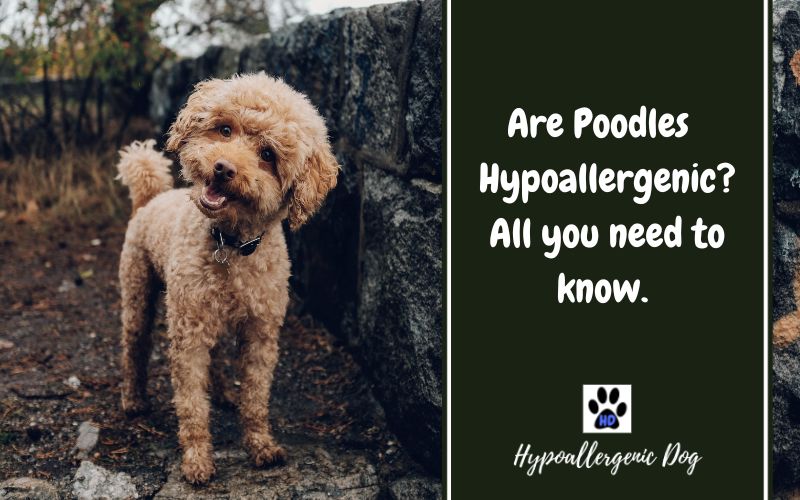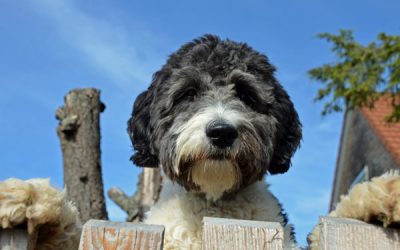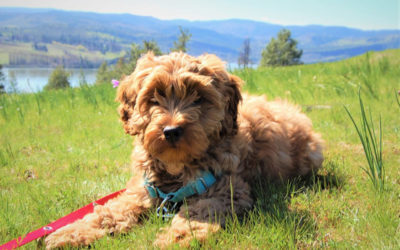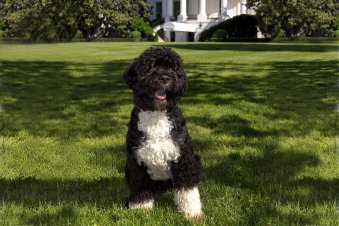Are Poodles Hypoallergenic?
Yes! The Poodle is a hypoallergenic dog breed that hardly sheds or drools.
The Poodle is a popular hypoallergenic dog breed, known for it’s loyal nature and high intelligence. Well known for their faithful and fun personalities, Poodles make excellent family dogs, as well as superb working dogs. The Poodles’ wool-like, hypoallergenic coat of hair is low dander and non-shedding, making them a wonderful choice for people with dog allergies. This breed comes in a range of sizes from the tiny Toy Poodle and small Miniature Poodle, to the large Standard Poodle. Due to their non-shedding coats and their versatile build and temperament, Poodles are often used to breed new designer dog breeds such as the Labradoodle, Goldendoodle, Cockapoo, Maltipoo, and Aussiepoo. Despite their popularity, Poodles and most of their mixes aren’t the best choice for some households. These highly intelligent, active dogs require plenty of physical and mental exercise, as well as constant grooming. Looking for a good training book?
The dog training tutor is having a sale. Their $99 bundle is just $47 right now, and comes with a money back gaurantee. Learn more here!
For a quick summary of the Poodle skip to our Poodle dog breed summary further down the page.
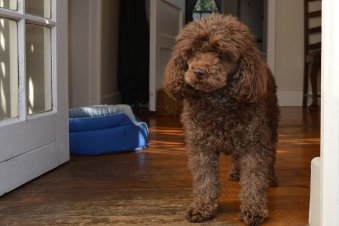
Poodle Quick Facts
| Hypoallergenic Dog: | Yes! |
| Shedding: | Low shedding |
| Drooling: | Low |
| Size: | Toy, Miniature, Standard |
| Breed Group: | Non-Sporting |
| Lifespan: | 12 – 15 years |
| Energy Level: | High |
| Trainability: | High |
| Family Dog: | Yes! |
About the Breed
The Poodle Physical Characteristics and Coat
(Skip this section) The Poodle is one of the most popular breeds, year after year. They come in a variety of sizes to suit any . The Standard Poodle is considered a medium to large dog breed, averaging around 18 to 24 inches tall. They weigh anywhere between 40 to 70 pounds. The Miniature Poodle is 11 to 15 inches tall and weighs 15 to 17 pounds, while the tiny Toy Poodle maxes out at just 10 inches tall and weighs anywhere from 6 to 9 pounds. Although Poodles come in a variety of sizes, they are just one breed, and their temperaments are all very similar across the various sizes. The beauty of the variety of Poodle sizes is you can choose a dog which is the perfect size to suit your home, lifestyle, budget, and time availability. The Poodle’s lifespan is around 12-15 years and the breed has very few health problems. Standard Poodles can be prone to hip issues, like many medium to large dog breeds. Miniature and Toy Poodles do need some extra consideration due to their size. Although adorable to look at, they may not be the best fit for a family with young children or other rowdy pets as they can be delicate. Poodle coat colors are just as varied as their size. Though most think of the typical white Poodle when the breed’s name is mentioned, they are actually bred in many different coat colors. These colors range from apricot, silver, tan, sable, red, brown, black and tan, blue, or black and white. Additionally, the Poodle’s coat is well recognized for its hypoallergenic qualities, as evidenced by the huge number of Poodle mixes that have appeared in recent years – Cavoodles, Labradoodles, Moodles – oodles of Poodle cross breeds, all inspired by the wonderful non-shedding Poodle coat!
What Makes Poodles Hypoallergenic?
Most often when people say they are allergic to dogs, they are in fact allergic to what dogs produce. The three general dog allergies are pet dander that is often attached to hair strands or shed on its own, saliva, and urine. The primary factor that leads to Poodles of all sizes being good candidates for hypoallergenic homes are their unique coats. Poodles have a single wool-like coat, without an undercoat, which is composed of dense curly strands. Their hair does not shed, but continually grows. Due to the spiral nature of their fur, any loose hair and dander is trapped in the coat and can be brushed out. Most allergies associated with animals are founded on reactions to specific animal dander. Since Poodles shed less hair and dander, they are a more compatible match to those with dog allergies. Poodles are widely accepted as a non-shedding, non-allergenic dog breed. Poodles also have a very low tendency to drool. Their energy and loving nature can make them prone to licking, but since they are relatively easy to train, Poodles can be taught not to lick owners. Poodles are also a very clean breed as well as happy to please, and between that and their high intelligence, they are potty training enthusiasts. They can be easily trained to defecate on command or only in certain areas. This will significantly reduce the risk of allergic reaction to dog urine. Though no animal is 100% hypoallergenic, Poodles are a solid hypoallergenic option for owners with allergy concerns.
Even though Poodles are great at potty training, you still have to know how to train them. Potty training is more of a science, whereas behavioral training is more of an art. Toy Poodles can also struggle with potty training due to their smaller stature. If you need to brush up on the potty training technique, we recommend this book! With this guide, you should have your dog potty trained in about a week! If the techniques don’t work for you, you can get for your money back within 60 days – no questions asked. Don’t skimp when it comes to learning about potty training – bad habits can take a lot longer to fix! Click here to check out this guide: How to house train any dog in 7 days or less.
Poodle Temperament
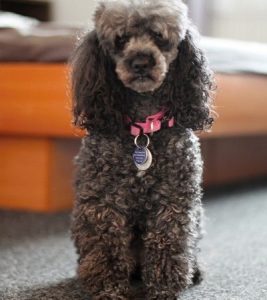
Poodles are fantastic family pets and great companions for anyone looking for a hypoallergenic breed. They are very sharp, easy to train, lively, active, faithful, instinctual and just plain silly at times. Poodles are ranked in the top 10 for the most intelligent dog breeds in the world. The Toy and Miniature Poodles are regarded as suitable for apartment living. They do, however require regular exercise, stimulation and companionship. Standard Poodles are considered to be very energetic and require exercise each day. They can still live in apartments, but you must ensure they get plenty of exercise. They are moderately vocal dogs and Poodle owners are not encouraged to leave their dog alone for long hours on end. Since Poodles are highly intelligent, they need regular companionship and stimulation. Poodles are incredibly faithful and versatile dogs, they make fantastic family dogs, and are great companions for kids. And they can also fulfill vital working dog roles, such as Guide Dogs for the blind and Police Dogs.
Brain Training for Dogs:
This is a product we recommend for anyone interested in a Poodle, or a Poodle mix. As one of the most intelligent dog breeds, Poodles really need mental stimulation. Brain Training for Dogs is a really awesome course that will walk your Poodle through all the “grade levels” to become a super awesome, happy, curious, intelligent, and well-adjusted pooch! Learn more here!
Poodle Training and Exercise
Encouraging Good Behavior In Your Poodle
(Skip this section) Poodles are relatively easy to train, since they are highly intelligent and love to please. Working with your Poodle to teach them basic skills and how to walk beside you on a lead, through to fun tricks for you and your dog can be a joy. Be consistent in your expectations and in working on their new skills. Keep training sessions fun and positive and end with lots of praise and a small treat they like.
Exercise Needs
The Standard Poodle is considered to be very energetic and requires exercise each day. They are still regarded as acceptable breeds for apartments, although regular walks are strongly encouraged. Toy Poodles and Miniature Poodles are well suited to apartment living, but also require a brisk walk and some active play every day. For adult Poodles, two 30 minute walks each day are recommended, to keep your Poodle happy and healthy. Given their intelligence, athleticism, and energy levels, Poodles are well suited to many dog sports. Participating in some of these sports, such as agility training, is fun, great exercise, and mentally stimulating for your Poodle (and yourself!). Additionally, it’s great for socialisation with other dogs and their humans for your friendly companion! Poodles have been known to compete in water sports, obedience, agility, and herding competitions. Nearly 75 Standard Poodles won Grand Championship awards from the American Kennel Club Competitions in 2017 alone.
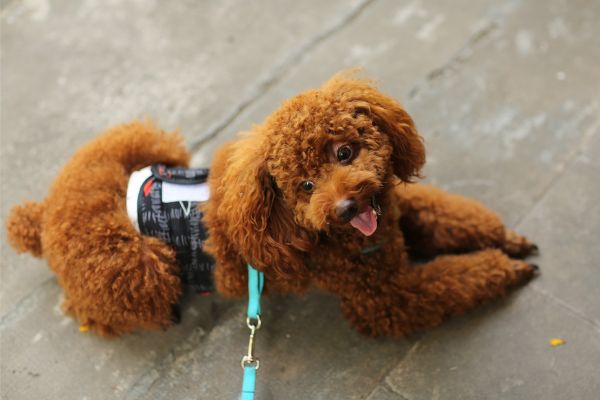
Poodle Grooming and Care
Maintaining Your Poodle’s Coat
(Skip this section) Since Poodles don’t shed, grooming is recommended every 6 weeks, whether with a grooming service or by the owner. Daily brushing will also help to reduce any knotting or remove foliage that may lodge in your Poodles fur. Many choose to use Poodle grooming as an opportunity to show off their dog’s unique personality. As a general rule, hair can be trimmed short and close to the body to enhance the Poodles’ hypoallergenic qualities. For owners of smaller breeds, or in cold environments, sweaters can be used to help the poodle stay at a comfortable temperature.
Teeth, Ears and Nails
Most breeds need a weekly nail trimming and their ears should also be checked once a week. If you notice any wax build-up in the ears, clean with a moistened wipe. Dental hygiene is also a necessary task for your Poodle but is often overlooked. Brushing their teeth at least 2-3 times a week can prevent gum disease and tartar buildup. Doing so will also allow you to see any teeth that may be broken or missing.
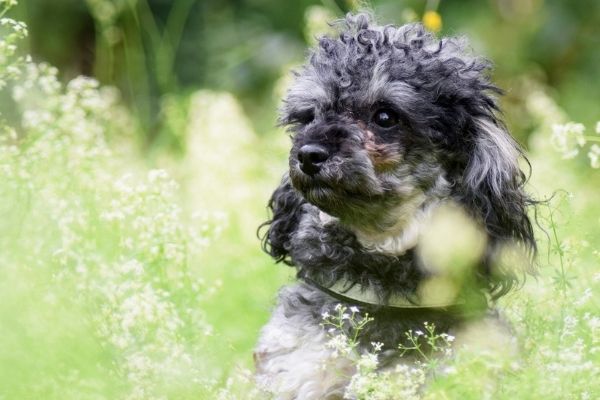
Health
Poodle Health Issues and Care
Poodles are generally considered a robust breed. High quality breeding is continuing to ensure this breed maintains good health. However Poodles of all sizes share some common health concerns such as progressive retinal atrophy, hip dysplasia, epilepsy, Addison’s disease, thyroid issues, hypoglycemia, boat, and collapsed trachea. Standard Poodles are more likely to develop cancer, where as Miniature and Toy Poodles have more of a tendency to develop dental problems, or other health problems that are common to small breeds such as: luxating patellas, and Legg-Calve-Perthes disease. These small Poodles are also prone to develop sebaceous adenitis which is a skin condition. Maintaining regular exercise, a healthy diet, good grooming standards, keeping up to date with their vet visits and vaccinations, and of course, plenty of love, affection and stimulation will help your Poodle to remain happy and healthy for many years.
Poodle Health Problems
Progressive Renal Atrophy
Cataracts
Corneal Ulcers
Retinal Dysplasia
Glaucoma
Sebaceous Adenitis (more common in standard poodles)
Addison’s disease
Hypothyroidism
Bloat : More common in older dogs More common in Standard Poodles
Von Willebrand’s Disease
Thrombopathia (blood disease) (thrombocytopenia)
Hip Dysplasia
Epilepsy
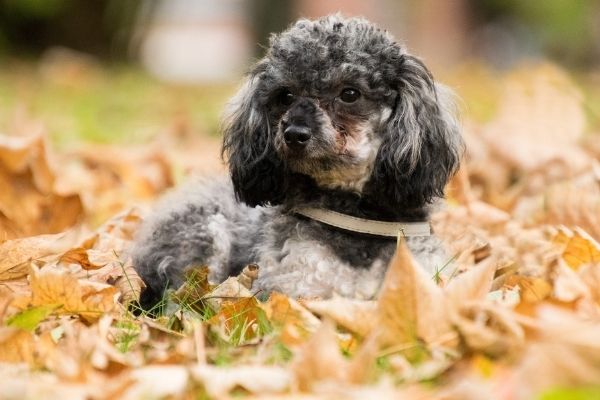
Other Interesting Poodle Facts
The Poodle is the national dog of France. The French word for Poodle is Caniche. It means duck dog. A most likely reason for the name is that Poodles were bred to be excellent swimmers. Poodles have been a favorite breed since the 1500s and are still ranked one of the top breeds in the world. Not only have poodles been made famous in TV and movie productions, but they also outshine the competition in show rings.
Conclusion
(Skip this section) Poodles are an intelligent, friendly, personable option for those looking to get a hypoallergenic pet. Their coat is essentially non-shedding and they are mostly a clean, odorless breed. Due to the fact that they don’t drool, and they’re easy to train, they’re an excellent breed choice for those who suffer from dog allergies. The Poodle is one of the most popular dog breeds, year after year. They come in a variety of sizes and are well adjusted to apartment living. Standard Poodles require more exercise than smaller Poodles do, where as Toy and Miniature Poodles require more companionship and are not as adaptable to outdoor living due to their sensitivity to the cold. All in all, these dogs are excellent pets, and are hailed as the second smartest dog breed in the world. So if you are looking for an intelligent, faithful and loving hypoallergenic dog breed, consider the Poodle!
Poodle FAQ
Do Poodles Shed a Lot?
Poodles hardly shed at all. Their hair continues to grow, without shedding. They do, however need daily brushing and grooming every 6 weeks, to maintain their hypoallergenic coat in it best condition.
Do Poodles Have Hair or Fur?
Poodles have hair, which continually grows and needs to be clipped every 6 weeks.
Do Poodles Have Dander?
All dogs have dander, but Poodles’ dander levels are low, and the little they have is caught in their coat and can be brushed out easily. Many people report their Poodle is hypoallergenic, and they have no problems with dog dander from their Poodle. If you are allergic to dog dander, it’s recommended you spend some time around Poodles, to see how your allergies react to them before making the decision to buy a Poodle.
Are Poodles Smart?
Absolutely! Their intelligence is evidenced by some of the jobs they do – police dogs, guide dogs, etc. They consistently make it into the top 10 smartest dogs lists!
Do Poodles Bark a Lot?
It all depends on how you train them. With correct training, Poodles can be taught to ‘speak’ and be ‘quiet’. Use positive reinforcement to affirm your Poodle when it is behaving appropriately. Be consistent when they are young, and this intelligent breed will soon learn to be quiet and only bark when necessary.
Are Poodles Aggressive Dogs?
Poodles are generally lively and good natured dogs. Some smaller poodles can tend to be a little aggressive toward strangers at times, but proper socialisation, love, and training can ensure you will have a happy, well adjusted dog.
Are Poodles Good Family Dogs?
Poodles of all sizes make wonderful family dogs! They are affectionate, great with kids, and patient. Toy and Miniature Poodles may need supervision with small children until the children are able to understand how to be gentle with your dog.
Are Poodles Good Apartment Dogs?
Toy and Miniature Poodles suit apartment living well. Standard Poodles tend to need more space, but can live in an apartment. In all cases, it’s vital to ensure you give your Poodle regular exercise. Twice daily walks are encouraged, to ensure your apartment Poodle receives adequate exercise, stimulation and fresh air.
Are Poodles Water Dogs?
Poodles love water! The German name for Poodle is Pudelhund, which comes from a verb “pudel”, which means “to splash around.” They have webbed feet and a coat that shakes water off easily, allowing them to dry fast. It is thought that the Poodle has some water dog genes in its ancestry, so, while Poodles aren’t strictly water dogs, they are certainly water-loving dogs and well adapted for swimming!
Poodle Facts Summary
| Breed | Poodle |
| Other Names? | Pudelhund , Caniche (in France, meaning duck dog) |
| Hypoallergenic? | Yes |
| Height | Toy Poodle: 9.4 – 11 in. Miniature Poodle: 11 – 14 in. Standard Poodle: 18 – 24 in. |
| Weight | Toy : 6-9 lbs (3-4 kg) Miniature : 15-17 lbs (7-8 kg) Standard : 45-70lbs (20-32 kg) |
| Lifespan | 12 – 15 years |
| Temperament | Intelligent, Instinctual, Active, Trainable, Alert, Faithful |
| Colours | Apricot, Black, White, Black & Tan, Cream, Blue, Black & White, Silver, Red, Brown, Sable, Grey |
| Coat – describe the coat | Poodles have a single layer coat (no undercoat is present) composed of dense, curly fur that sheds minimally. |
| How much grooming? | Brushing three times a week, coat trims every six weeks |
| How much shedding | Non-Shedding |
| Dander levels | Low dander level |
| Saliva – Do they Drool or Lick much? | Low |
| Energy levels | Very energetic |
| How much exercise do they need? | 40 to 60 minutes a day, ideally in 2 shorter walks |
| Health problems | Prone to bloat, hip dysplasia, Addison’s Disease, epilepsy, eye problems, Sebaceous Adenitis, and Von Willebrand’s Disease |
| Good for apartment? | Poodles do well in apartments, though regular walks are recommended. |
| Suitable for kids? | Great with kids |
| How much do they bark? | Moderate |
| Can they be left alone? | They don’t like to be left alone for hours on end. |
| Intelligent? | Yes, ranked second most intelligent dog breed. |
| Trainable? | Highly Trainable |
| How popular as a pet? | Popular |
| Any other important facts? | The poodle is athletic and does well in many dog sports. They are the national dog for the country of France. Poodles shine in the glamour of the show ring, but they also work as guide dogs for the blind and police dogs. They compete in all dog sports, from running the Iditarod and herding sheep to obedience and agility. |

